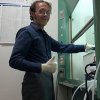Many people probably do not know what carbon nanotubes are, but knows they’re something to get excited about.
knows they’re something to get excited about.
Zeidell, a graduate student in the Department of Physics and Astronomy, heard about carbon nanotubes from a friend who had researched them. The topic piqued his interest, and he began to research ways to reduce the cost of their production. Carbon nanotubes are used in flexible technologies, like flexible touch screens, and are more durable than copper wires or other traditional metals, but are very expensive to grow.
“Carbon nanotubes are as conductive as metals, but they weigh thousands of times lighter than traditional metals,” Zeidell says. “We’re always looking for ways to create better electronics, and if carbon nanotubes could be brought to the forefront of the industry and be cheap enough to apply, it could prevent using earth metals and causing lots of environmental damage.”
When Zeidell began his research in the fall of 2011, he sought out assistant professor Brad Conrad because of his mutual interest in carbon nanotubes. “When I first met Brad, he was totally welcoming, and passionate about the project,” Zeidell remembers. “He got me started on the project and let me run with it, but he provided some resources and encouragement.”
On behalf of Zeidell, Conrad worked with the Office of Student Research Funding at Appalachian, and their research obtained the North Carolina Space Grant in 2012. Conrad and Zeidell conducted their research in conjunction with two co-authors from Rochester, New York, and another professor who now resides in Virginia.
The team presented their research at the American Physical Society meeting in March 2013, in Baltimore, Maryland, and also at the NC Space Grant conventions in 2013 and 2014. Meanwhile, Zeidell graduated from Appalachian with a Bachelor of Science degree in Applied Physics in May 2014, and immediately began working on a Master’s degree in Engineering Physics, which he is scheduled to complete in May 2016. He also plans to pursue a doctorate degree.
The lab portion of the research project ended in the fall of 2013, but the group’s analysis continued through January 2015. That month, their work was published in the Journal of Vacuum Science and Technology, and mentioned on its cover.
Zeidell credits Appalachian for helping him pursue this project. “Research defined my career at Appalachian State, and helped guide my decisions along the way, and also led to personal development,” he says. “It taught me that I could take on a task, and pursue it to completion, all of my own volition. My endeavors here have been the greatest challenge and reward yet in my life, and I owe a great many thanks to my mentor, Dr. Conrad, and the wonderful faculty and staff in every department I have interacted with for helping me accomplish what I have.”
However, Conrad says that this research would not have happened without Zeidell. “Andrew did every single step, he conceived of this project, and did all the measurements,” Conrad smiles. “Andrew is one of the best and brightest students I have ever had. I’m really excited to see where his career takes him.”
To learn more about the Department of Physics and Astronomy, please visit physics.appstate.edu.